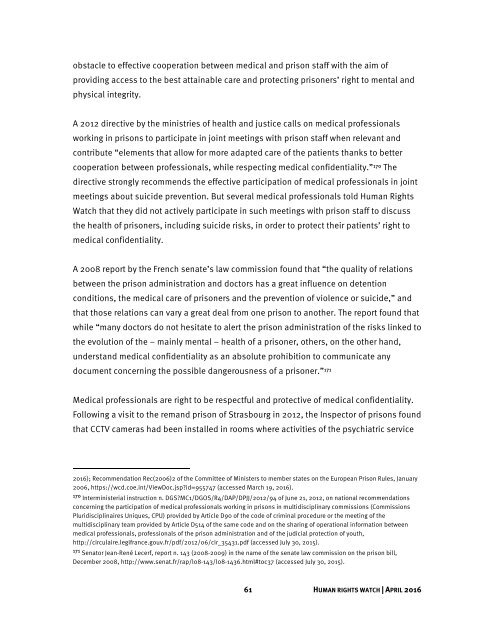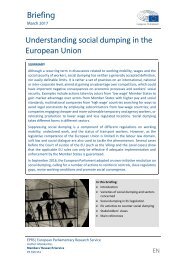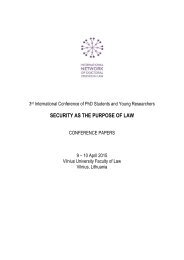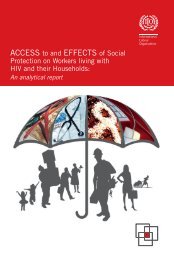DOUBLE PUNISHMENT
france0416web
france0416web
You also want an ePaper? Increase the reach of your titles
YUMPU automatically turns print PDFs into web optimized ePapers that Google loves.
obstacle to effective cooperation between medical and prison staff with the aim of<br />
providing access to the best attainable care and protecting prisoners’ right to mental and<br />
physical integrity.<br />
A 2012 directive by the ministries of health and justice calls on medical professionals<br />
working in prisons to participate in joint meetings with prison staff when relevant and<br />
contribute “elements that allow for more adapted care of the patients thanks to better<br />
cooperation between professionals, while respecting medical confidentiality.” 170 The<br />
directive strongly recommends the effective participation of medical professionals in joint<br />
meetings about suicide prevention. But several medical professionals told Human Rights<br />
Watch that they did not actively participate in such meetings with prison staff to discuss<br />
the health of prisoners, including suicide risks, in order to protect their patients’ right to<br />
medical confidentiality.<br />
A 2008 report by the French senate’s law commission found that “the quality of relations<br />
between the prison administration and doctors has a great influence on detention<br />
conditions, the medical care of prisoners and the prevention of violence or suicide,” and<br />
that those relations can vary a great deal from one prison to another. The report found that<br />
while “many doctors do not hesitate to alert the prison administration of the risks linked to<br />
the evolution of the – mainly mental – health of a prisoner, others, on the other hand,<br />
understand medical confidentiality as an absolute prohibition to communicate any<br />
document concerning the possible dangerousness of a prisoner.” 171<br />
Medical professionals are right to be respectful and protective of medical confidentiality.<br />
Following a visit to the remand prison of Strasbourg in 2012, the Inspector of prisons found<br />
that CCTV cameras had been installed in rooms where activities of the psychiatric service<br />
2016); Recommendation Rec(2006)2 of the Committee of Ministers to member states on the European Prison Rules, January<br />
2006, https://wcd.coe.int/ViewDoc.jsp?id=955747 (accessed March 19, 2016).<br />
170 Interministerial instruction n. DGS?MC1/DGOS/R4/DAP/DPJJ/2012/94 of June 21, 2012, on national recommendations<br />
concerning the participation of medical professionals working in prisons in multidisciplinary commissions (Commissions<br />
Pluridisciplinaires Uniques, CPU) provided by Article D90 of the code of criminal procedure or the meeting of the<br />
multidisciplinary team provided by Article D514 of the same code and on the sharing of operational information between<br />
medical professionals, professionals of the prison administration and of the judicial protection of youth,<br />
http://circulaire.legifrance.gouv.fr/pdf/2012/06/cir_35431.pdf (accessed July 30, 2015).<br />
171 Senator Jean-René Lecerf, report n. 143 (2008-2009) in the name of the senate law commission on the prison bill,<br />
December 2008, http://www.senat.fr/rap/l08-143/l08-1436.html#toc37 (accessed July 30, 2015).<br />
61 HUMAN RIGHTS WATCH | APRIL 2016











